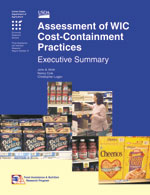Assessment of WIC Cost-Containment Practices: Executive Summary
- by John A. Kirlin, Nancy Cole and Christopher Logan
- 5/26/2003
Overview
The Special Supplemental Nutrition Program for Women, Infants, and Children (WIC) provides both nutrition education and supplemental foods containing nutrients determined by nutritional research to be lacking in the diets of pregnant, breastfeeding, and post-partum women, infants, and children. State WIC agencies have implemented practices designed to reduce the cost of food packages containing these prescribed foods. For instance, one of the WIC program's primary cost-saving practices is negotiating rebate contracts with manufacturers of infant formula. Additional practices include limiting authorized vendors to stores with lower food prices; limiting approved brands, package sizes, forms, or prices; and negotiating rebates with food manufacturers or suppliers. There is concern that these practices may inadvertently counter the program's goal of providing supplemental foods and nutrition education. Based on a review of cost-containment practices in six States, including interviews with the various stakeholders and analysis of WIC administrative files, the study draws three major conclusions: (1) cost-containment practices reduced average food package costs by 0.2 to 21.4 percent, depending on practices implemented and local conditions; (2) the cost-containment practices had few adverse outcomes for WIC participants; and (3) administrative costs of the practices were low, averaging about 1.5 percent of food package savings.
Download
-
Entire report
Download PDF

